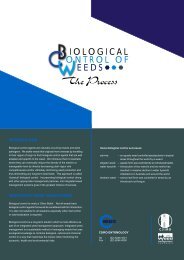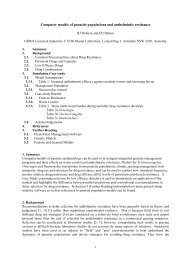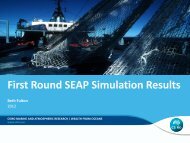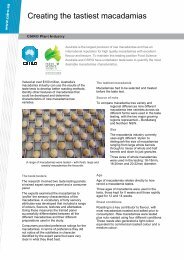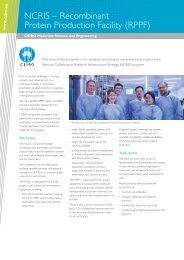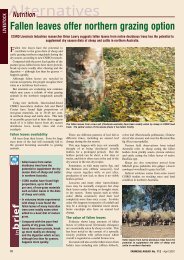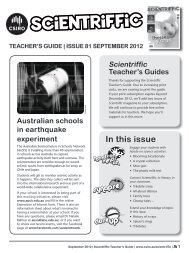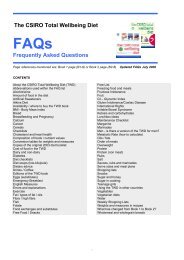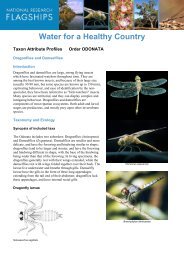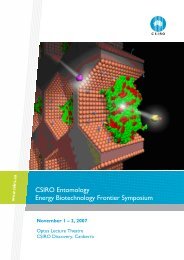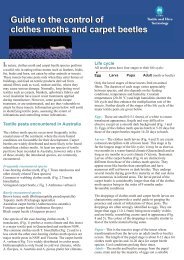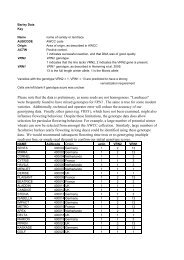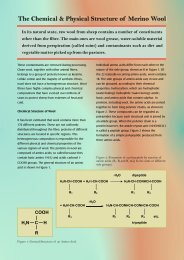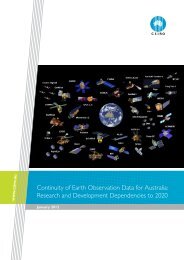WfHC - cover page (not to be used with pre-printed report ... - CSIRO
WfHC - cover page (not to be used with pre-printed report ... - CSIRO
WfHC - cover page (not to be used with pre-printed report ... - CSIRO
Create successful ePaper yourself
Turn your PDF publications into a flip-book with our unique Google optimized e-Paper software.
shooting [at] crocs there! We saw the shells along the Alice River, on the gorge. And [they<br />
were] using quad bikes <strong>to</strong> get around, killing pigs for the tusks. Shooting the crocs, that‟s<br />
wrong.<br />
Marcus Bar<strong>be</strong>r: Is it good <strong>to</strong> have pigs there?<br />
Wilfred Jimmy: Pigs are good eating. We got <strong>to</strong> learn <strong>to</strong> keep them. They are destroying<br />
<strong>to</strong>o much. But the pig hunters get in there [and] they got no permit. They‟ve <strong>be</strong>en living in<br />
the home there [at Oriners] and they <strong>to</strong>ok the windows and <strong>used</strong> it for firewood. It would <strong>be</strong><br />
good <strong>to</strong> get back there and have someone living there.<br />
---------------------------------------<br />
Philip Yam: [The pig hunters] would tie the meat up <strong>with</strong> ropes, hang them, may<strong>be</strong> just that<br />
far above the water.<br />
Marcus Bar<strong>be</strong>r: And when the croc comes up for it they‟d shoot it?<br />
Viv Sinnamon: Oh they‟d come hanging around there <strong>be</strong>cause they can smell it.<br />
Philip Yam: And you find some bullet shells, where they are camping.<br />
Viv Sinnamon: It was [also] an old traditional way of catching fish. They <strong>used</strong> <strong>to</strong> get green<br />
frogs and warm them up, then bash them a bit and wrap them in bark <strong>with</strong> grass, and hang<br />
them above the water. And the drip, the drip would attract the fish, and then men <strong>used</strong> <strong>to</strong><br />
just stand there <strong>with</strong> spears and wait, and they‟d wait until the biggest fastest looking fish<br />
<strong>used</strong> <strong>to</strong> come along, and that‟s how they <strong>used</strong> <strong>to</strong> catch fish. So it‟s the same idea. Some of<br />
the other pig shooters may have put meat hooks on the ropes, so when the croc leaps, the<br />
poor bastard catches on it. I think we‟ve got a pho<strong>to</strong>. Boxhead [Michael Yam] <strong>to</strong>ok a pho<strong>to</strong><br />
that time they came <strong>with</strong> us.<br />
Some stations in the area, such as Strathburn, attempt <strong>to</strong> use pig hunters as an economic<br />
opportunity by running a pig hunting safari business venture<br />
(http://www.strathburnsafaris.com.au/safari.php). Early planning sessions at Oriners did<br />
discuss potential eco<strong>to</strong>urism and other low impact <strong>to</strong>urist ventures, but eco<strong>to</strong>urism ventures<br />
are <strong>not</strong> currently planned for Oriners, <strong>with</strong> the main emphasis of activity on public and private<br />
sources of revenue relating <strong>to</strong> conservation and natural resource management.<br />
During one research visit <strong>to</strong> Oriners in the mid-dry season, a num<strong>be</strong>r of vehicles were<br />
observed passing through in both directions in a single morning. The current road passes<br />
directly past the homestead, making moni<strong>to</strong>ring of passing traffic easy when people are living<br />
there, but leaving the homestead and station vulnerable when people are <strong>not</strong>. The impact of<br />
a new road which re-directs traffic a few kilometres around the homestead is yet <strong>to</strong> <strong>be</strong> felt.<br />
The crucial issue in managing ongoing <strong>to</strong>urist traffic and trespass through the area is regular<br />
residence there, particularly in the early dry season when the road from the east may<br />
<strong>be</strong>come passable <strong>be</strong>fore the road west <strong>to</strong> Kowanyama is. Regular residence requires people<br />
committed <strong>to</strong> staying there and resources <strong>to</strong> support them. The latter issue is considered in<br />
the next section.<br />
2.5.7 Resources and funding<br />
A lack of funding for resources constrains the logistics of supporting Oriners, and therefore<br />
the ability of people <strong>to</strong> remain there. That lack of residence has had consequences for the<br />
care and maintenance for infrastructure at the site, which in turn increases the longer term<br />
costs of remaining there. Both Louie Native and Philip Yam, who have extensive recent<br />
experience of living in the area, referred <strong>to</strong> the chopper costs in the wet season, particularly<br />
when a larger and more expensive chopper was needed <strong>to</strong> ferry a num<strong>be</strong>r of people or a<br />
significant amount of supplies from Kowanyama. However cyclone evacuations, which had<br />
<strong>be</strong>en a<strong>not</strong>her basis for chopper flights, were <strong>not</strong> felt by either of them <strong>to</strong> have <strong>be</strong>en<br />
Working Knowledge at Oriners Station, Cape York<br />
101



